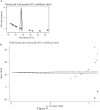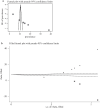Knowledge and utilisation of preconception care and associated factors among women in Ethiopia: systematic review and meta-analysis
- PMID: 33858438
- PMCID: PMC8048176
- DOI: 10.1186/s12978-021-01132-9
Knowledge and utilisation of preconception care and associated factors among women in Ethiopia: systematic review and meta-analysis
Abstract
Background: Preconception care is the provision of biomedical, behavioural, and social health interventions provided to women and couples before conception. However, in Ethiopia, little is known and practised to support preconception care. Therefore, this study aimed to assess women's knowledge and utilisation of preconception care and its associated factors in Ethiopia using systematic review and meta-analysis.
Method: In the current meta-analysis, variables were searched from different electronic database systems, which included PubMed, Google Scholar, EMBASE, HINAR, Scopus, Web of Sciences, and Grey literature. Data were extracted using a standardised data collection measurement tool. The data were analysed by using STATA 14 statistical software. I2 tests assessed heterogeneity between the studies. A random-effect model was used to forecast the pooled knowledge and utilisation of preconception care.
Results: Thirteen full-text studies were included. The pooled prevalence of knowledge and utilisation of preconception care among women in Ethiopia was 30.95% and 16.27% respectivelly. Secondary education (OR = 2.78, 95% CI,2.01-3.85), college and above (OR = 5.05, 95% CI,2.70-9.44), and antenatal care (OR = 3.89, 95% CI, 1.69-8.98) were significantly associated with knowledge level whereas; age (OR = 2.43, 95% CI, 1.30-4.53) and knowledge on preconception care (OR = 3.95, 95% CI,2.35-6.62) were positively associated with utilisation of preconception.
Conclusions: Women's level of knowledge and utilisation of preconception care was significantly low. Educational status and antenatal care follow-up were factors shown to affect knowledge of preconception care. Age and having a sound knowledge of preconception care indicated a significant association towards utilisation of preconception care. Thus, integrating preconception care strategies and policies that can address all the components of preconception care services with other maternal and child health services will be essential when designing effective implementation strategies to improve preconception care uptake. Besides this, advocating for better education for women, awareness creation, and increasing antenatal care services are essential. Prospero registration: CRD42020218062.
Keywords: Ethiopia; Knowledge; Meta-analysis; Preconception care; Systematic review; Utilisation.
Conflict of interest statement
The authors declare that there is no competing interest.
Figures







Similar articles
-
Postpartum intrauterine contraceptive device use and its associated factors in Ethiopia: systematic review and meta-analysis.Reprod Health. 2021 Nov 13;18(1):225. doi: 10.1186/s12978-021-01273-x. Reprod Health. 2021. PMID: 34774058 Free PMC article.
-
Knowledge and practice of essential newborn care and associated factors among women in Ethiopia: systematic review and meta-analysis.Reprod Health. 2022 Aug 4;19(1):172. doi: 10.1186/s12978-022-01480-0. Reprod Health. 2022. PMID: 35927762 Free PMC article.
-
Magnitude of postpartum hemorrhage and associated factors among women who gave birth in Ethiopia: a systematic review and meta-analysis.Reprod Health. 2022 Sep 21;19(1):194. doi: 10.1186/s12978-022-01498-4. Reprod Health. 2022. PMID: 36131345 Free PMC article.
-
Home treatment for mental health problems: a systematic review.Health Technol Assess. 2001;5(15):1-139. doi: 10.3310/hta5150. Health Technol Assess. 2001. PMID: 11532236
-
Time to initiation of antenatal care and its predictors among pregnant women in Ethiopia: Cox-gamma shared frailty model.PLoS One. 2021 Feb 5;16(2):e0246349. doi: 10.1371/journal.pone.0246349. eCollection 2021. PLoS One. 2021. PMID: 33544714 Free PMC article.
Cited by
-
Preconception care in sub-Saharan Africa: A systematic review and meta-analysis on the prevalence and its correlation with knowledge level among women in the reproductive age group.SAGE Open Med. 2023 Feb 13;11:20503121231153511. doi: 10.1177/20503121231153511. eCollection 2023. SAGE Open Med. 2023. PMID: 36819933 Free PMC article.
-
"We Are Having a Huge Problem with Compliance": Exploring Preconception Care Utilization in South Africa.Healthcare (Basel). 2022 Jun 6;10(6):1056. doi: 10.3390/healthcare10061056. Healthcare (Basel). 2022. PMID: 35742106 Free PMC article.
-
Association between preconception care and family planning and previous adverse birth outcomes in Ethiopia: systematic review and meta-analysis.BMJ Open. 2024 May 7;14(5):e078299. doi: 10.1136/bmjopen-2023-078299. BMJ Open. 2024. PMID: 38719286 Free PMC article.
-
The magnitude of preconception care utilization and associated factors among women in Ethiopia: systematic review and meta-analysis, 2024.BMC Pregnancy Childbirth. 2025 Mar 8;25(1):259. doi: 10.1186/s12884-025-07394-6. BMC Pregnancy Childbirth. 2025. PMID: 40057689 Free PMC article.
-
Birth preparedness and complication readiness practice and associated factors among pregnant women in Central Ethiopia, 2021: A cross-sectional study.PLoS One. 2022 Oct 27;17(10):e0276496. doi: 10.1371/journal.pone.0276496. eCollection 2022. PLoS One. 2022. PMID: 36301854 Free PMC article.
References
-
- World Health Organization. Meeting to develop a global consensus on preconception care to reduce maternal and childhood mortality and morbidity: World Health Organization Headquarters, Geneva, 6–7 February 2012: meeting report.
-
- World Health Organization . WHO Fact sheet N348. Geneva: World Health Organization; 2016.
Publication types
MeSH terms
LinkOut - more resources
Full Text Sources
Other Literature Sources
Medical

